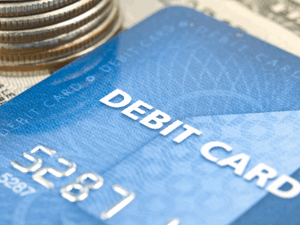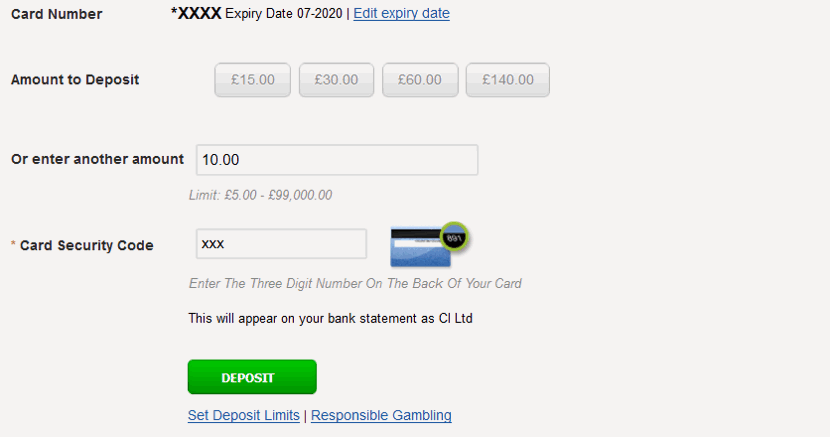 Betting online using a debit card is the most favoured form of Payment in online gambling. Visa Debit, Visa Electron and Maestro are the most common and most accepted payment methods by all UK bookmakers.
Betting online using a debit card is the most favoured form of Payment in online gambling. Visa Debit, Visa Electron and Maestro are the most common and most accepted payment methods by all UK bookmakers.
Debit card funding is available with every bookmaker listed on this site. Betting using your bank card is one of the safest and easiest ways to deposit and withdraw. Fees are very rarely charged by bookmakers for this service, which also tends to have the lowest minimums and high maximums.
As long as your bank account is in credit and you are funding your betting account using the same currency then your bank should not charge you fees to send and receive money this way.
It is no longer possible in the UK to deposit and bet via Visa Credit or MasterCard Credit cards due to a ban brought in in 2020.
Bet365 - Best Debit Card Betting Site

Bet365 have some of the lowest limits around for both deposits (£5) and withdrawals (£5) when using VISA or Maestro debit cards. You can deposit and withdraw up to £20,000 in a single transaction and withdraw up to £30,000 in a single transaction, all fee free.
Due to the size of the operator processing time is also the quickest around, typically taking just 1-5 days for the funds to reach your account.
The fact Bet365 are industry giants means they have one of the best and most professional betting products to back up their solid payment systems.
Online Bookmakers That Accept Visa / Maestro Debit Cards
| Site | Min Deposit | Min Withdraw | Fees | Withdrawal Time | Visit | |
|---|---|---|---|---|---|---|
 |
Betfred | £5 | £5 | - | Up to 48hrs |
T&Cs Apply, 18+
|
 |
Bet365 | £5.00 | £5.00 | 0% | 1-2 Banking Days |
T&Cs Apply, 18+
|
 |
All British Sports | £10 | £20 | 0% | 24 Hours |
T&Cs Apply, 18+
|
 |
Parimatch | £5 | £10 | - | 2-5 Days |
T&Cs Apply, 18+
|
 |
BetVictor | £5 | £10 | - | 2-5 Days |
T&Cs Apply, 18+
|
 |
Midnite | £5 | £5 | 0% | 2-5 Days |
T&Cs Apply, 18+
|
 |
BetGoodwin | £10 | £5 | 0% | 1-4 Days |
T&Cs Apply, 18+
|
 |
10bet | £10 | £1 | - | 1-2 Business Days |
T&Cs Apply, 18+
|
 |
Virgin Bet | £5 | £10 | 0% | 1-5 Days |
T&Cs Apply, 18+
|
 |
SpreadEx Sports | £10 | £10 | 0% | 1-5 Days |
T&Cs Apply, 18+
|
 |
Kwiff | £10 | £10 | - | 3-5 Days |
T&Cs Apply, 18+
|
 |
Fitzdares | £10 | £10 | 0% | 1-5 Days |
T&Cs Apply, 18+
|
 |
Mr.Play | £10 | £10 | 0% | Up to 6 Days |
T&Cs Apply, 18+
|
 |
The Pools | £5 | £10 | 0% | 2-5 Days |
T&Cs Apply, 18+
|
 |
Unibet | £5 | £15 | - | 1 - 3 Days |
T&Cs Apply, 18+
|
 |
LiveScore Bet | £5 | £10 | 0% | 1-5 Days |
T&Cs Apply, 18+
|
 |
Smarkets | £10 | £10 | - | 1-6 Days |
T&Cs Apply, 18+
|
 |
Copybet | £10 | £1 | 0% | 2-5 Days |
T&Cs Apply, 18+
|
 |
BetZone | £10 | £10 | - | 3-5 Days |
T&Cs Apply, 18+
|
 |
Rhino | £10 | £10 | - | 3-5 Days |
T&Cs Apply, 18+
|
 |
Party Casino | £10 | £10 | 0% | 3-5 days |
T&Cs Apply, 18+
|
 |
Vbet | £10 | £10 | - | 5-7 Days |
T&Cs Apply, 18+
|
 |
Fafabet | £10 | £5 | - | 1-4 Days |
T&Cs Apply, 18+
|
 |
Grosvenor Sports | £5 | £5 | - | 1-3 Days |
T&Cs Apply, 18+
|
 |
Luckster | £10 | £10 | - | 6-8 Days |
T&Cs Apply, 18+
|
 |
Bettarget | £10 | £10 | 0% | 0-6 Days |
T&Cs Apply, 18+
|
 |
Ladbrokes | £5 | £5 | - | Within 4 hours |
T&Cs Apply, 18+
|
 |
Coral | £5 | £5 | - | 1-3 Days |
T&Cs Apply, 18+
|
 |
QuinnBet | £10 | £10 | 0% | 1-3 Days |
T&Cs Apply, 18+
|
 |
NetBet | £10 | £10 | - | Up to 5 Days |
T&Cs Apply, 18+
|
 |
BETDAQ | £10 | £10 | 0% | 2-5 Days |
T&Cs Apply, 18+
|
 |
LeoVegas Sports | £10 | £10 | 0% | Up to 24 Hours |
T&Cs Apply, 18+
|
 |
Boylesports | £5 | £5 | - | 3-5 Days |
T&Cs Apply, 18+
|
 |
32Red Sports | £10 | £10 | - | 2-3 Days |
T&Cs Apply, 18+
|
Using A Debit Card To Fund Betting Accounts
A debit card is simply a payment card that gives the bank account holder the means to access their bank account electronically and can be used in place of cash when making purchases or when transferring money to another institution, such as a betting site. The use of debit cards in the UK has almost entirely replaced the use of cheques and charge cards. Funds are instantly provided as soon as the account holder verifies the transaction allowing you to place funding in your online account instantly.
Debit card transactions require you to have funds or an agreed overdraft associated with the account in question and so constitutes one of the best ways to bet. This allows you to monitor your deposits and withdrawals closely through your own bank account. It is worth noting however that many banks may monitor your transactions. This does not mean your bank will not let you bet but if there is unusual activity your bank may suspend your account in order to verify your intentions first. Don’t worry once your bank realises you like to place a bet they will count these types of transactions as normal.

Some banks are better than others for leaving you alone when you bet. Beware though that some, but not all, betting site transactions will show up on your statement as the company in question. If this concerns you then you may be better funding your account using e-Wallet services as an intermediary.
Visa Debit, Visa Electron, Maestro and MasterCard are the most common debit card operators. This is not your bank itself but simply the company that powers the payment systems they use. Most major UK bank accounts are powered by these providers. Other, often older, forms of debit card exist and where Visa and Maestro are accepted other formats are usually taken too, but not always. Check out our individual bookmaker reviews for detailed lists of accepted payment methods.
There are many debit card systems in use in the world, here we will focus on the systems, processes and procedures in use in the UK. In Britain debit card payments are accepted everywhere. By 1994 half of UK adults already had a debit card rising to around 98% today. The EFTPOS (electronic funds transfer at point of sale) payment system is universally used.
Is Visa, MasterCard and Maestro Gambling Legal?
 UK online bookies are registered and licenced with the gambling commission and this means they are safe to bet with and safe to deposit with. Visa, MasterCard and Maestro cards are the most funding mechanism used to bet in and I have never heard of a UK banking institution refusing to fund a UK registered betting account.
UK online bookies are registered and licenced with the gambling commission and this means they are safe to bet with and safe to deposit with. Visa, MasterCard and Maestro cards are the most funding mechanism used to bet in and I have never heard of a UK banking institution refusing to fund a UK registered betting account.
As mentioned earlier occasionally some banks will block gambling transactions, especially if this is the first time depositing to a new operator or if you are depositing a larger than usual amount of money. This does not mean you are not allowed to use a debit card to gamble, it is simply the banks security anti-fraud checks kicking in. Ring or contact your bank and tell them it is you and you authorise these transactions and you should have no further issues.
A word of caution if you decide to fund accounts not registered in the UK then the bank is unlikely to guarantee your funds if they suddenly disappear. Here at OnlineBetting.org.uk we only cover UK licenced betting companies.
All sites that accept debit cards will no longer accept credit cards as these were banned by the government for online and offline betting in April 2020, other methods are available if you don’t want to use a bank account but in general it is better to stick to debit cards if you can.
How To Bet Using Debit Cards

Using Visa, Maestro and other debit facilities to fund account is really very easy. Enter your name, as printed on your card, for example, “Dr Carl Olme”. Give the billing address, this is the invoice address you have registered with your bank. Provide the long number on the card as well as the expiry date and sometimes the start date. Some cards have an issue number and you will need to provide this too if this is the case. Generally there will either be a start date or an issue number.
The final piece of information required is known as the CVV number and this is an additional anti-fraud feature to show that you are in actual possession of your card. The CCV number is printed in the top corner of the signature panel on the back of your card. For electronic transactions you will be asked for the last three digits of the CCV number.
One added advantage when depositing using debit cards to bookmakers and casinos is many of them can also use this as a source to verify your identity (by a process known as a soft credit check). If the name on the card and address match the name and address you signed up to the bank with then often this is all that is needed to confirm you are a UK resident and over 18 years of age. If you make a first deposit using PayPal, for example, then you will often have to additionally verify yourself.
If you are betting using an iPhone you can also use Apple Pay to fund some betting sites. This allows you to use the same debit cards to fund but you don’t actually need to share the card details, which has added security benefits.
History of Bank Cards
 In 1914 Western Union first issued metal payment cards to preferred customers to be used in place of cash. In 1950 the US Diners Club issue their first cards as charge cards for customers in a range of restaurants. Several charge cards were issued in the interim for various purposes until in 1958 American Express issued their first charge card. In 1962 the Diners Club launched in Britain and in 1963 AmEx launched with monumental fees (not much has changed then eh).
In 1914 Western Union first issued metal payment cards to preferred customers to be used in place of cash. In 1950 the US Diners Club issue their first cards as charge cards for customers in a range of restaurants. Several charge cards were issued in the interim for various purposes until in 1958 American Express issued their first charge card. In 1962 the Diners Club launched in Britain and in 1963 AmEx launched with monumental fees (not much has changed then eh).
1966 saw the first credit card issued in the by Barclays, called the Barclaycard and based on the AmEx model. The following year the first cash machine opened in Enfield and by 1972 NatWest, RBS, Midland and Lloyds pitched in together to create the Access Card. The British government brought in the Consumer Credit Act in 1974 to protect customers with credit card purchases over £30 (price at the time). Visa was first issued in the UK in 1980 and this lead to the breakup of the Access group.
By 1985/6 the Link and Matrix cash machine network had been established and in 1987 the first debit card was issued in the UK by Barclays, Lloyds, RBS and Bank of Scotland using Visa Delta. The following year the Switch debit card as created and used by Midland (now owned by HSBC), NatWest and RBS. Cheque guarantee limits were introduced and cashback emerged in 1990. In 1992 MasterCard launched Maestro as it brand for debit cards. Visa Electron was launched in 1996, the Solo card in 1997 and by 1998 debit transactions exceeded cheques.
In 2001 debit card spend first exceeds credit card expenditure and by 2002 chip and pin was announced in the UK. In 2004 Switch were rebranded as Maestro. 2007 saw the first contactless payment, 2008 the first mobile phone with contactless and finally the chip added security feature was included from 2009.
Countries Where Debit Cards Can Be Used For Gambling
Banks generally do not restrict funding of legal institutions, if you bet with a UK registered bookie from the UK then there should be no reason why your payment would be rejected. As a rule if gambling is legal in a country then banks from that country will allow you to use their accounts to fund online betting institutions.
If you have a bank account registered with a bank from a country where funding of gambling activity is not allowed then you may find it easier to fund your account through an e-Wallet system such as PayPal. Alternatively open a bank account in a country that allows gambling transactions.
Security
 In addition to the card security discussed above such as CCV numbers there are a whole raft of security measures in place to make visa betting and debit card betting in general one of the safest forms. Your card must be registered to your billing address for a start requiring verification from your bank. The bank will also monitor your account for fraudulent transactions and if you usually deposit £20 a week but then try to deposit £10,000, then if you are with a good bank they would stop this. Some banks also have additional password verification systems that you must enter at the end of any online transactions.
In addition to the card security discussed above such as CCV numbers there are a whole raft of security measures in place to make visa betting and debit card betting in general one of the safest forms. Your card must be registered to your billing address for a start requiring verification from your bank. The bank will also monitor your account for fraudulent transactions and if you usually deposit £20 a week but then try to deposit £10,000, then if you are with a good bank they would stop this. Some banks also have additional password verification systems that you must enter at the end of any online transactions.
The added identification security of a debit card over a credit card is one reason why there are no cash fees for use of debit but there are for credit cards. It is worth noting though if someone does hack your account and run off with your cash not all banks will guarantee your funds on a debit card whereas all funds up to a certain value are insured (under the Consumer Credit Act in the UK) on credit cards.
If you bet with many sites or use your debit card widely to purchase online there is an argument for using an eWallet such as Skrill. This way you only need store your actual credentials with the eWallet provider not directly with the sites and the less companies that have your card details on file the lower the risk they could be stolen. Alternatively consider pre-paid cards such as entropay, this way if there is theft of your details only the pre-paid money is at risk.
Debit Card Fees
![]() As a rule you really should not be paying fees when using debit cards. It is rare for your bank to charge you a fee for these services. Exceptions may be if your account is underfunded and you move into your agreed or unauthorised overdraft in which case you will pay fees applied by your bank.
As a rule you really should not be paying fees when using debit cards. It is rare for your bank to charge you a fee for these services. Exceptions may be if your account is underfunded and you move into your agreed or unauthorised overdraft in which case you will pay fees applied by your bank.
Another example is funding in different currencies, in this case you may pay a conversion commission fee and/or a non-transactional currency fee and even a cash fee. Remember funds loaded to betting sites are often classed as cash transactions.
It is rare to find a bookie that will charge you a fee to fund by Visa, Maestro or other debit. See the table at the top of this page or betting site reviews for information on fees charged by online bookies. Our advice would be not to pay fees this way if you don’t have to, there is so much choice out there why should you pay a fee?
Fees for these transactions are most common from betting exchanges such as Betfair.